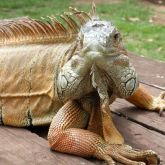Green iguana
Alert
Have you seen Green iguana?
Be on the lookout for Green iguana and report it to Biosecurity Queensland. Early detection and reporting are the key elements in preventing Green iguanas from becoming a major problem in Queensland.
Call us on 13 25 23.

Green iguana close up
© Queensland Government

Green iguana on deck
© Queensland Government

Green iguana crawling
© Queensland Government

Green iguana prominent dewlap
© Queensland Government
Native to Central and South America, green iguanas are large lizards with prominent dewlaps and spiny backs. In Florida, USA, escaped and released iguanas have established feral populations that damage vegetation, dig burrows, and can be aggressive if confronted by pets or people.
Green iguanas are an illegal pet in Queensland and no wild populations have been recorded in the state. However, they are suited to the climate throughout much of Queensland and could become a pest if introduced. Green iguanas could have adverse impacts on many native species, particularly native lizards.
To prevent green iguanas from establishing in Queensland, restrictions apply to their import, possession and sale.
You must not keep, feed, move, give away, sell or release into the environment. Penalties may apply.
You must report all sightings to Biosecurity Queensland within 24 hours.
Scientific name
Description
- Large lizard up to 2m long (including tail), average weight 4–6kg but can reach 9kg.
- Dewlap under throat is prominent, larger in males.
- Crest of robust dermal spines runs from neck to tail.
- Head has set of large scales on each side.
- Tympanum (hearing structure) has membrane covering.
- Tail is long, tapering, variably ringed.
- Colour ranges from green to brown, orange and bluish-green.
Habitat
- Prefers tropical and subtropical rainforest, riparian vegetation and urban parks with readily available water source.
Distribution
- No feral populations recorded in Queensland.
- Limited number of green iguanas kept under permit by zoos.
- Illegally kept green iguanas are occasionally detected and humanely destroyed.
Life cycle
- Life expectancy 8 years for wild animals, 20 years for captive.
- Sexually mature at 3–4 years.
- Females can store sperm for several years.
- Eggs are laid once a year in clutches of 20–70.
- Eggs hatch after 90–120 days.
- Juveniles stay with family groups for 1 year.
Affected animals
- Native reptiles
Impacts
Environmental
- Can compete with native species such as eastern water dragons for resources.
- Can overgraze native flora and spread weed seed.
Social
- Can injure people with tail slaps, bites and scratches.
Control
- If you see or are in possession of a green iguana, contact our Customer Service Centre within 24 hours.
Legal requirements
- The green iguana is a prohibited invasive animal under the Biosecurity Act 2014.
- You must not keep, feed, move, give away, sell or release into the environment. Penalties may apply.
- You must not take any action reasonably likely to exacerbate the biosecurity threat posed by green iguanas.
- You must take any action that is reasonably likely to minimise the biosecurity threat posed by green iguanas.
- You must report all sightings to Biosecurity Queensland within 24 hours.